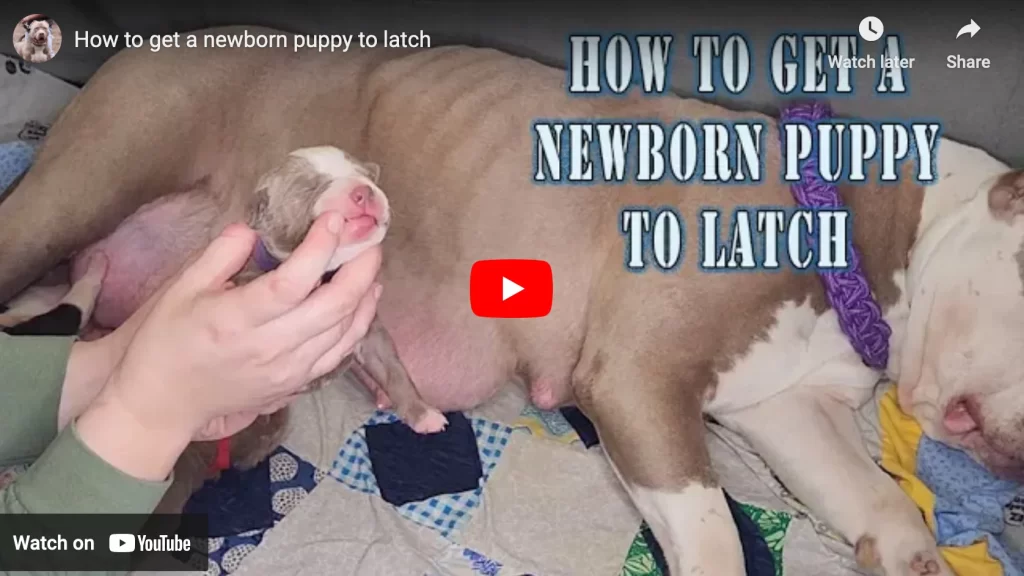A mother’s milk is important for newborn puppies to grow strong and healthy, and get the necessary antibodies to boost their immune system. However, what do you do if the mother dog is not producing milk?
Addressing this issue promptly and effectively is crucial for the mother’s and her litter’s well-being. This guide outlines the steps to take when dealing with a non-lactating mother dog.
Why mother dog is not producing milk?
Several factors can contribute to a mother dog’s inability to produce milk:
- Health Issues: Conditions like mastitis, hypocalcemia, or hormonal imbalances can hinder milk production. Infections or retained placentas are also common culprits.
- Nutritional Deficiency: Inadequate nutrition before or after birth can affect lactation. The mother dog needs a diet rich in protein, fat, and essential vitamins and minerals.
- Stress and Anxiety: Environmental stressors, changes in routine, or anxiety can inhibit milk production. Ensuring a calm and quiet environment is essential.
- Genetics and Breed: Some breeds are more prone to lactation issues due to genetic predispositions. Small dog breeds like chihuahuas, shih-tzus, and English setters are all prone to milk fever in dogs, which hinders milk production.
What do you do when a mother dog doesn’t have milk?
It is always a great idea to be prepared for when the mother dog may not have any milk at all. When nursing, mother dogs produce two important hormones, oxytocin and prolactin. Prolactin is the hormone responsible for triggering lactation in pregnant dogs. Oxytocin helps the mother dog bond with the puppies and also aids in milk production.
Dogs that give birth naturally produce these hormones without a problem. However, dogs that deliver through c-section may have a problem adjusting to motherhood. Their bodies will not produce prolactin and oxytocin naturally and this will cause the mother dog not to produce milk. Some dogs may just be too anxious about the whole motherhood process which hinders their ability to nurse newborn puppies.
When this happens, there is no need to panic. Go to a local grocery store and get a pack of o your local store and get a pack of goat’s milk. Goat milk is more digestible compared to cow milk. Puppies struggle to digest cow milk and it can make them ill or cause puppy diarrhea.
As part of your whelping checklist, you can stock up on goat’s milk days before your dog gives birth. Also, get a baby feeding bottle to administer the milk.
What you need;
- Goats milk
- 0-1 month-old baby feeding bottle (regular nipple)
How to give milk to puppies at home
- Warm the goat milk to around 95-100°F (35-37°C). Put the warm milk in the baby’s feeding bottle.
- Test the milk on your hand first to ensure it is warm and not too hot. Tip the bottle to make sure the milk is dripping slowly through the nipple
- Bottlefeed each puppy until they are full.
- Check if the puppy is full by feeling behind the ribs. This area should feel round and not empty, indicating the puppy has had enough milk.
- Another easy sign to spot is when the puppy cries excessively or is restless indicating they are still hungry. A full puppy will most times fall asleep immediately.
- You can refrigerate leftover milk until the next feeding session.
- Reuse this milk two to three times. After the third time, discard leftover goat milk and replace it with fresh milk.
Relieve a bloated puppy through an enema. Read our article on How to give a dog an enema.
How do you get mother dog to produce milk naturally?

Once you feed the puppies goat milk, allow them to latch on the mother dog’s nipple for a while. This will stimulate the mother to produce oxytocin and prolactin hormones. Do this every time you feed the puppies until the mother dog produces milk naturally.
What to do if my dog is not producing enough milk?
- See a vet
Schedule an appointment with a veterinarian to diagnose any underlying health issues. Blood tests and physical examinations can help identify the root cause of the problem. The vet may prescribe medications to treat infections or hormonal supplements to stimulate milk production.
- Improve the dog’s nutrition and hydration
If the mother dog is not producing milk, diet could be the problem. Feed the mother dog a high-quality, nutrient-rich diet. Consider puppy food for its higher calorie and nutrient content. Ensure she has constant access to fresh water. Hydration is crucial for milk production.
What can I feed my nursing dog to produce more milk?
Increasing milk production in a lactating mother dog involves providing a balanced and nutritious diet, ensuring she stays hydrated, and sometimes incorporating specific foods or supplements that can support lactation. Here are some recommendations:
- High-Quality Puppy Food
Feeding the mother dog high-quality puppy food is essential as it is richer in calories, protein, and nutrients than regular adult dog food. Puppy food helps meet the increased nutritional needs during lactation.
- Increased Calories
Lactating dogs require more calories. Gradually increase the amount of food she consumes to about 1.5 to 3 times her normal intake, depending on the number of puppies she is nursing.
- Protein
Ensure her diet is high in protein. Protein is crucial for milk production. Consider foods that are rich in protein like lean meats, eggs, and fish.
- Fats
Healthy fats are important for energy. Include sources of healthy fats such as fish oil or flaxseed oil.
- Calcium and Phosphorus
These minerals are important for milk production. You can provide them through high-quality commercial diets, or consider adding a supplement, but always consult a veterinarian before adding supplements.
Natural foods to give mother dog to produce milk
1. Chicken: Boiled, skinless chicken is an excellent source of protein.
2. Eggs: Cooked eggs can provide additional protein and fats.
3. Cottage Cheese: This can be a good source of calcium and protein.
4. Oatmeal: Provides energy and helps with milk production.
5. Yogurt: A good source of calcium and probiotics. Plain yoghurt is preferable.
Best natural supplements for milk production in dogs
- Fenugreek: Known to help increase milk production in both humans and animals.
- Goat’s Rue: Another herb that can support lactation.
- Brewer’s Yeast: This can provide B vitamins and support overall health.
Natural hydration for nursing dogs at home
- Fresh Water: Ensure she has access to plenty of fresh water at all times. Hydration is crucial for milk production.
- Broth: Chicken or beef broth can encourage her to drink more fluids and provide additional nutrients.
Tips to remember when taking care of nursing dog and puppies at home
- Regular Feeding Schedule: Feed the mother dog multiple small meals throughout the day rather than one or two large meals.
- Comfortable Environment: Ensure she has a quiet and comfortable place to nurse her puppies, reducing stress which can impact milk production.
- Veterinary Check-Ups: Regular check-ups with the vet to ensure she and her puppies are healthy.
- Creating a Stress-free Environment; Provide a quiet, comfortable space for the mother and her puppies. Limit visitors and noise to reduce stress.
- Maintain a consistent routine; it helps the mother dog feel secure and relaxed.
I am a highly skilled content writer and SEO expert with a passion for helping small businesses succeed in the digital world. With my extensive knowledge of the latest SEO techniques and strategies, I have successfully assisted numerous clients in improving their website rankings, generating more leads, and driving a significant increase in website traffic.
As a professional content writer and SEO expert, I am confident in my ability to contribute significantly to the success of small businesses. If you are seeking a results-driven, highly skilled digital marketer who can help you increase your ranking, convert new leads, and see a substantial improvement in website traffic, I would welcome the opportunity to collaborate with you.
Website: https://manmadewebsites.com/
Email: hello@digitalmarketingchap.com




